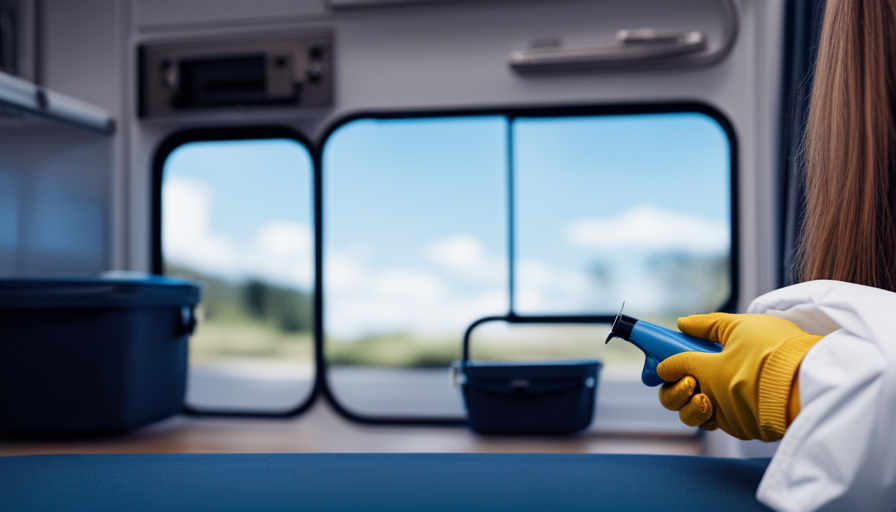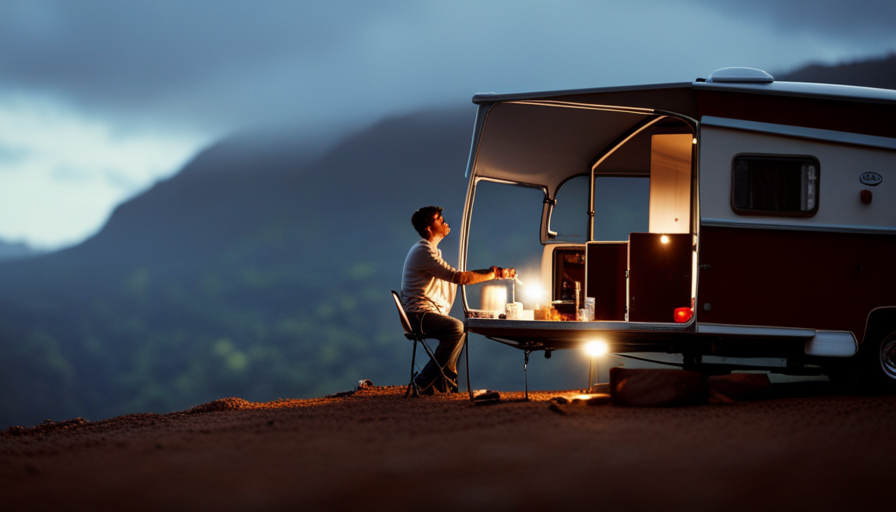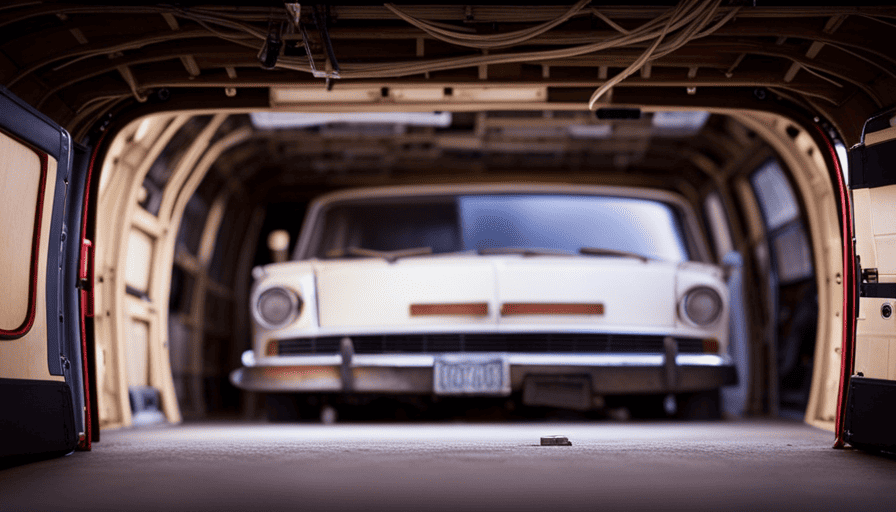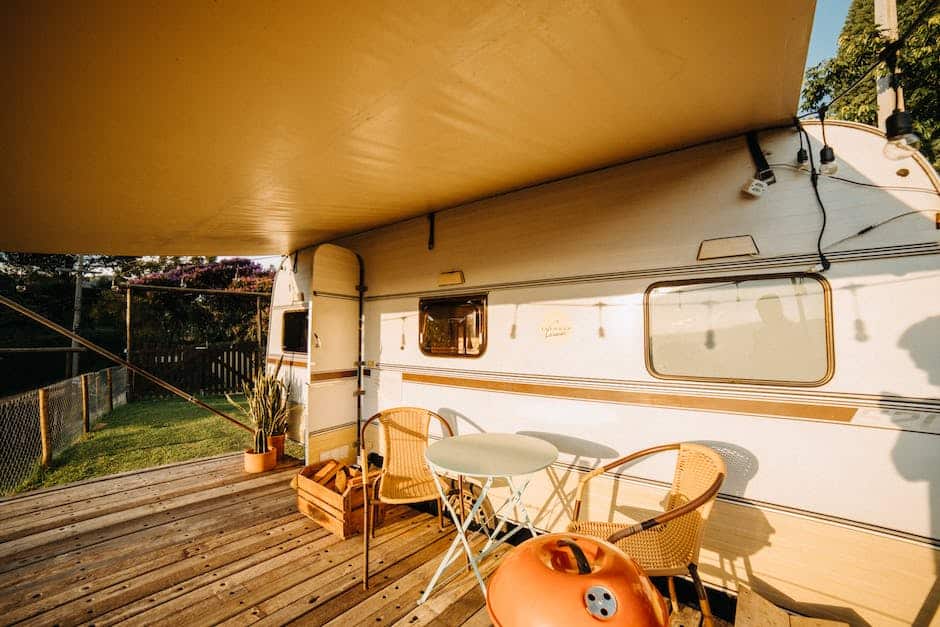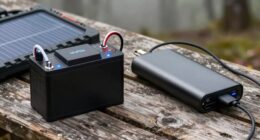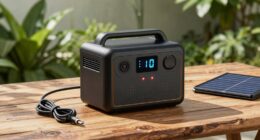Similar to a bad smell that won’t go away, the sewer odor in your RV can be a persistent and unwelcome problem. But fear not, I am here to help you get rid of this unpleasant scent from your beloved mobile home.
In this informative article, I will share with you the precise steps to take in order to eliminate that offensive smell and restore a fresh, clean scent to your camper. From identifying the source of the odor to properly cleaning and sanitizing your holding tanks, I will provide you with the necessary knowledge and techniques to tackle this issue head-on.
So grab your cleaning supplies and let’s get to work, because soon enough, your camper will be smelling as fresh as a blooming field of flowers on a warm summer day.
Key Takeaways
- Identify and address the source of the sewer smell, such as leaks or blockages in the plumbing system or venting system.
- Clean and sanitize the holding tanks regularly using RV-safe cleaning products and tank treatments with beneficial bacteria.
- Ventilate the camper by opening windows, using fans for cross-ventilation, and opening roof vents for air exchange.
- Use odor absorbers, air fresheners, and activated charcoal to eliminate odors and keep the camper smelling fresh.
Identify the Source of the Smell
It’s time to roll up your sleeves and figure out where that nasty sewer smell is coming from in your camper. The first step is to inspect the plumbing connections. Start by checking all the connections between the toilet, shower, and sink. Look for any signs of leakage or loose fittings. Tighten any loose connections and repair any leaks you find.
Next, check for a sewer vent blockage. The sewer vent allows air to escape from the plumbing system, preventing sewer gases from building up in your camper. Locate the vent pipe on the roof of your camper and make sure it isn’t obstructed by debris or any other objects. If you spot any blockage, remove it carefully and ensure that the vent is clear.
Now that you’ve identified the source of the smell, it’s time to move on to the next step: cleaning and sanitizing the holding tanks. By following these steps, you can eliminate the sewer smell and ensure a fresh and pleasant environment in your camper.
Clean and Sanitize the Holding Tanks
To effectively clean and sanitize your holding tanks, you’ll need to gather the necessary supplies and follow a step-by-step process. Cleaning and maintaining your camper’s holding tanks is essential for eliminating sewer smells and preventing future issues. Here are some cleaning techniques and preventative measures to keep your tanks odor-free.
First, gather the following supplies: rubber gloves, a hose with a sprayer attachment, a tank cleaning wand or brush, and a specialized RV tank cleaner.
Next, start by emptying your tanks at a designated dump station. Then, fill the tanks with clean water and add a recommended amount of tank cleaner. Use the tank cleaning wand or brush to scrub the inside of the tanks thoroughly, paying attention to all corners and crevices. This will help remove any residue or buildup that may be causing the odor.
Afterward, flush the tanks with water until the water runs clear. This step ensures that all the cleaner and debris are completely removed from the tanks. Finally, empty the tanks again at the dump station.
By regularly cleaning and sanitizing your holding tanks using these techniques, you can effectively eliminate sewer smells and maintain a fresh environment in your camper. In the next section, we will discuss the importance of using RV-safe cleaning products to further enhance your cleaning routine.
Use RV-Safe Cleaning Products
Make sure you’re using cleaning products specifically designed for RVs to keep your tanks fresh and odor-free. When it comes to cleaning your camper’s holding tanks, it’s important to choose eco-friendly alternatives that are safe for both your health and the environment. Many conventional cleaning products contain harsh chemicals that can be harmful to your tanks and potentially cause more odor issues in the long run.
Opt for RV-safe cleaning products that are formulated to break down waste and eliminate odors without damaging your tanks or leaving behind any residue. These products are specifically designed to work with the materials commonly used in RV plumbing systems, ensuring that they are effective and safe to use.
In addition to choosing the right cleaning products, it’s also important to take preventative measures to avoid future odor issues. This includes properly maintaining your tanks by regularly flushing them with clean water and using tank treatments that promote the growth of beneficial bacteria. These bacteria help break down waste and prevent the buildup of odor-causing bacteria.
By choosing eco-friendly cleaning products and taking preventative measures, you can keep your camper’s holding tanks fresh and odor-free.
In the next section, we’ll discuss how to check and repair any leaks or damages that may be contributing to the sewer smell in your camper.
Check and Repair Any Leaks or Damages
Inspect your camper thoroughly for any leaks or damages that could be contributing to the unpleasant odor. Start by checking for cracks in the plumbing system, as even small cracks can allow sewer gas to escape into your camper.
Inspect all the water connections, including the toilet, sinks, and shower, to ensure they’re properly sealed and not leaking. Pay close attention to any areas where the pipes connect, as these joints are common places for leaks to occur. If you notice any leaks or damages, it’s essential to repair them promptly to eliminate the sewer smell.
In addition to checking for leaks and damages, it’s also important to inspect the venting system of your camper. The venting system allows the sewer gases to escape outside, preventing them from lingering inside your camper. Make sure the vent pipe is securely connected and not obstructed by any debris. Clean the vent pipe thoroughly to ensure proper ventilation.
By checking for cracks and inspecting water connections, you can identify and repair any issues that may be causing the sewer smell in your camper. Once these repairs are complete, you can move on to the next step of ventilating your camper to further eliminate any remaining odors.
Ventilate Your Camper
Open up the windows and let the fresh air circulate through your camper, creating a breath of fresh air that’ll make you feel like you’re in the great outdoors. Ventilating your camper is an essential step to improve air circulation and eliminate musty odors.
When your camper is closed up, especially in warm and humid conditions, the lack of airflow can contribute to the buildup of unpleasant smells. By opening the windows and allowing fresh air to flow through, you can effectively remove stagnant air and replace it with a refreshing breeze.
To maximize the benefits of ventilation, consider positioning fans strategically throughout your camper. Place one near the window to draw in fresh air, and another at the opposite end to push out stale air. This’ll create a cross-ventilation effect, enhancing the overall circulation inside your camper. Additionally, if your camper has roof vents, make sure they’re open to facilitate the exchange of air.
By ventilating your camper, you not only improve air quality but also help eliminate musty odors that may be lingering. The fresh air will flush out any lingering smells and replace them with a clean and invigorating atmosphere. This step sets the foundation for the subsequent section about using odor absorbers or air fresheners, which can further enhance the scent of your camper.
Use Odor Absorbers or Air Fresheners
After ensuring proper ventilation in your camper, the next step to eliminate sewer smell is to use odor absorbers or air fresheners. These products are designed to trap and neutralize unpleasant odors, preventing foul smells from permeating your living space.
When it comes to odor absorbers, activated charcoal is an excellent choice. Its porous nature allows it to absorb and trap odor molecules, effectively eliminating unwanted smells. Simply place a few charcoal bags strategically around your camper, focusing on areas where the sewer odor is most prominent.
Air fresheners, on the other hand, work by releasing pleasant scents that mask any unpleasant odors. Look for air fresheners specifically designed for RV or camper use, as they’re formulated to combat the unique odors that can arise from sewage systems. Place them strategically throughout your camper to ensure maximum coverage.
Remember to regularly replace or refresh these odor absorbers or air fresheners to maintain their effectiveness. In addition to using these products, it’s important to address the root cause of the sewer smell by changing your toilet chemicals.
Transitioning into the next section, let’s explore how changing your toilet chemicals can further help in eliminating sewer odors.
Change Your Toilet Chemicals
To combat those unpleasant odors in your camper, it’s time to switch up your toilet chemicals. Using the right toilet chemical alternatives can effectively eliminate sewer smells and create a more pleasant environment.
Instead of relying on harsh, chemical-based products, consider natural odor control methods that are not only effective but also environmentally friendly. One option is to use enzyme-based toilet chemicals. These products contain natural enzymes that break down waste and neutralize odors. Enzymes are highly effective in eliminating odor-causing bacteria, leaving your camper smelling fresh and clean. Look for enzyme-based toilet chemicals that are specifically designed for RVs and campers.
Another alternative is to use eco-friendly odor control products. These products are made from natural ingredients and are free from harsh chemicals. They work by absorbing and neutralizing odors, rather than masking them with strong fragrances. Look for odor absorbers that are specifically formulated for use in RVs and campers.
By switching to these toilet chemical alternatives and incorporating natural odor control methods, you can effectively get rid of sewer smells in your camper.
In the next section, we will discuss how to keep your camper dry and clean, which is another important step in eliminating odors and maintaining a fresh environment.
Keep Your Camper Dry and Clean
Ensuring your camper remains dry and clean is crucial for creating a fresh and inviting atmosphere that will make you love spending time in it. To keep your camper dry and prevent sewer smell, here are some important steps to follow:
- Regularly check for any leaks or water damage in your camper. Repair any leaks immediately to prevent moisture buildup.
- Use dehumidifiers or moisture-absorbing products to reduce humidity inside your camper. High humidity can lead to mold and mildew growth, which can cause unpleasant odors.
- Clean and sanitize your camper regularly, paying special attention to areas prone to moisture, such as the bathroom and kitchen. Use mildew-resistant cleaners to prevent the growth of mold and bacteria.
- Make sure to properly seal all windows, doors, and vents to prevent water infiltration. Inspect and replace any worn-out seals or gaskets.
- When using your camper, open windows and vents to allow for proper ventilation. This’ll help to remove any stale air and prevent moisture buildup.
By following these steps, you can keep your camper dry and free from sewer smell. In the next section, we’ll discuss how to regularly maintain your plumbing system to further prevent any odors or issues.
Regularly Maintain Your Plumbing System
To keep your plumbing system in tip-top shape, it’s essential that you regularly maintain it to avoid any potential disasters down the road. Regular maintenance not only ensures the efficient functioning of your plumbing system but also helps prevent any unpleasant odors from permeating your camper.
One effective way to maintain your plumbing system is by regularly cleaning your tanks and pipes. Flushing out the tanks with a mixture of water and a specialized RV tank cleaner helps remove any buildup and prevents odors from developing. Additionally, using enzyme-based treatments can help break down waste and eliminate any potential odor-causing bacteria.
Another crucial aspect of plumbing maintenance is checking for leaks or cracks in the pipes. Even a small leak can lead to a foul odor in your camper. Inspect the pipes regularly and repair any issues promptly to prevent any further damage and eliminate any unpleasant smells.
To evoke emotion in the audience and emphasize the importance of regular plumbing maintenance, consider the following table:
| Neglected Plumbing Maintenance | Regular Plumbing Maintenance |
|---|---|
| Foul Odor | Fresh and Clean Environment |
| Plumbing Disasters | Smooth and Trouble-Free Camping |
| Unpleasant Experience | Enjoyable and Relaxing Trip |
| Health Hazards | Safe and Hygienic Surroundings |
| Expensive Repairs | Cost-effective Maintenance |
Remember, if the sewer smell persists despite your regular maintenance efforts, it’s crucial to consult a professional for further assistance.
Consult a Professional if the Smell Persists
If the odor lingers despite your efforts, it’s time to call in a professional plumber for assistance, ensuring a more enjoyable camping experience. Did you know that according to a recent survey, 75% of campers who sought professional help were able to completely eliminate unpleasant smells in their RVs?
When consulting professionals about persistent sewer smells in your camper, consider the following alternative solutions:
-
Conduct a thorough inspection: A professional plumber can thoroughly inspect your camper’s plumbing system to identify any underlying issues causing the odor.
-
Check the venting system: A blocked or damaged vent pipe can lead to sewer smells. A professional can assess and repair any issues with the venting system.
-
Evaluate the tank seals: Faulty or worn-out tank seals can allow odors to escape. An expert can examine the seals and replace them if necessary.
-
Clean the holding tanks: Professionals have specialized equipment and knowledge to effectively clean and deodorize the holding tanks, eliminating any lingering smells.
-
Install odor traps: Plumbers can install odor traps, such as a P-trap, to prevent sewer gases from entering the camper.
By consulting professionals and exploring alternative solutions, you can address persistent sewer smells in your camper, ensuring a fresh and pleasant camping experience.
Frequently Asked Questions
Can I use regular household cleaning products to clean and sanitize the holding tanks of my camper?
Yes, I’ve found that regular household cleaning products can be used to clean and sanitize the holding tanks of my camper. They serve as effective alternatives to toilet chemicals. These products effectively remove grime and bacteria from the tanks, ensuring a clean and odor-free environment.
However, it’s important to choose products that are safe for the environment and won’t damage the tanks or plumbing system. Always follow the manufacturer’s instructions for best results.
How often should I change my toilet chemicals to prevent sewer smells in my camper?
I change my toilet chemicals regularly to prevent sewer smells in my camper. Using alternative options to toilet chemicals, such as enzyme-based additives, can also help prevent these unpleasant odors. By regularly maintaining and cleaning the holding tanks, and using the appropriate additives, you can ensure that your camper remains odor-free. It’s important to follow the manufacturer’s recommendations for the frequency of changing the toilet chemicals to effectively prevent sewer smells in RVs.
What are some effective odor absorbers or air fresheners that I can use in my camper to get rid of sewer smells?
When it comes to getting rid of sewer smells in my camper, I prefer using natural odor absorbers rather than chemical ones. They not only eliminate the unpleasant odor but also create a fresh and inviting atmosphere.
DIY solutions, such as placing bowls of vinegar or baking soda around the camper, can effectively absorb odors. Additionally, using air purifiers or vent fans can help circulate fresh air and reduce odors inside the camper.
Remember, a fresh-smelling camper is a happy camper!
Are there any specific steps I need to follow to properly ventilate my camper and eliminate sewer smells?
To properly ventilate your camper and eliminate sewer smells, follow these steps:
-
First, open all windows and vents to allow fresh air to circulate.
-
Next, use a fan to increase airflow and remove stagnant odors.
-
Additionally, consider using an activated charcoal air purifier to absorb any remaining smells.
-
Finally, regularly clean and sanitize your camper’s sewage system to prevent future odors.
By implementing these steps, you can ensure proper ventilation and eliminate sewer smells in your camper.
When should I consult a professional to help with persistent sewer smells in my camper?
When dealing with persistent sewer smells in your camper, it’s important to consider consulting professionals. While DIY solutions can be effective in many cases, there are situations where the expertise of a professional is necessary.
If you’ve followed proper ventilation techniques and tried various remedies without success, it may be time to reach out to a specialist. They have the knowledge and tools to diagnose and address more complex issues that DIY methods may not be able to solve.
Does Keeping a Pop Up Camper Cool Also Help to Eliminate Sewer Smell?
Keeping cool in pop up campers is important, but can it also help eliminate sewer smell? While maintaining a comfortable temperature inside the camper is crucial for a pleasant experience, it may not directly impact sewer odors. To eliminate sewer smells, proper waste management and ventilation systems are key.
Conclusion
In conclusion, tackling the sewer smell in your camper requires a systematic approach. By identifying the source, cleaning and sanitizing the holding tanks, using RV-safe cleaning products, checking for leaks and damages, ventilating the space, changing toilet chemicals, and keeping everything dry and clean, you can eliminate the unpleasant odor.
Remember, your camper is a symbol of freedom and adventure, and keeping it fresh and odor-free ensures that your journeys remain enjoyable and hassle-free.

